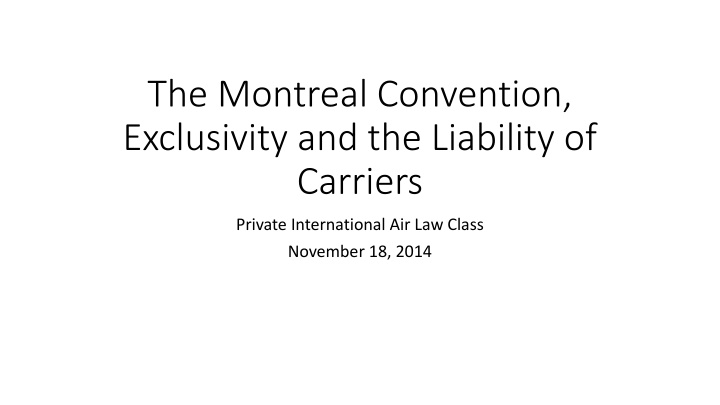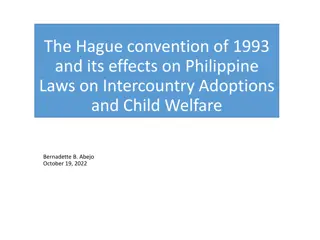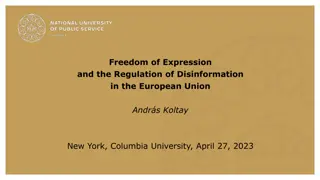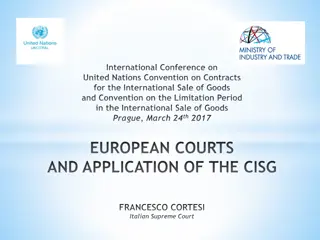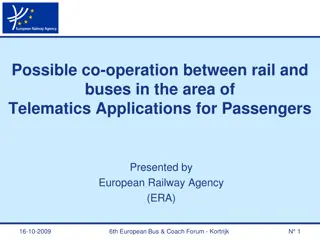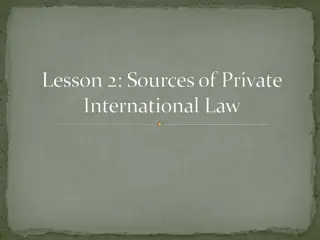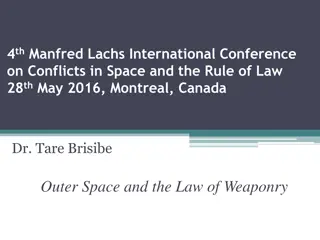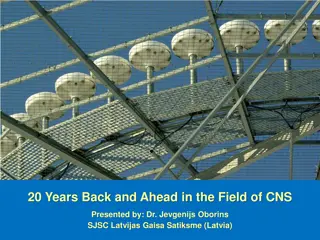International Air Law: Montreal Convention and European Regulation 261/2004
The Montreal Convention and European Regulation 261/2004 establish rules and remedies for air passengers' rights and liabilities of carriers. These regulations cover compensation for flight delays, cancellations, and rerouting options for passengers departing from airports in Member States. Passengers are entitled to cash compensation or reimbursement based on the distance of the flight and the duration of the delay. The regulations also include provisions for rerouting passengers to their final destination under comparable transport conditions.
Download Presentation

Please find below an Image/Link to download the presentation.
The content on the website is provided AS IS for your information and personal use only. It may not be sold, licensed, or shared on other websites without obtaining consent from the author.If you encounter any issues during the download, it is possible that the publisher has removed the file from their server.
You are allowed to download the files provided on this website for personal or commercial use, subject to the condition that they are used lawfully. All files are the property of their respective owners.
The content on the website is provided AS IS for your information and personal use only. It may not be sold, licensed, or shared on other websites without obtaining consent from the author.
E N D
Presentation Transcript
The Montreal Convention, Exclusivity and the Liability of Carriers Private International Air Law Class November 18, 2014
European Regulation 261/2004
Architecture & Basic Provisions Article 3 Scope 1. This Regulation shall apply: (a) to passengers departing from an airport located in the territory of a Member State to which the Treaty applies; (b) to passengers departing from an airport located in a third country to an airport situated in the territory of a Member State to which the Treaty applies, unless they received benefits or compensation and were given assistance in that third country, if the operating air carrier of the flight concerned is a Community carrier.
Basic Remedies Provided Remedy 1: Article 7 Passenger Right to Compensation Discounted Undiscounted Delay in Arrival not more than Amount by 50 percent Amount EUR 250 for all flights of 1500 kilometres or less; EUR 125 2 hours EUR 400 for all intra-Community flights of more than 1500 kilometres, and for all other flights between 1500 and 3500 kilometres; EUR 200 3 hours EUR 600 for all flights not falling under (a) or (b). 4 hours EUR 300
3. The compensation referred to in paragraph 1 shall be paid in cash, by electronic bank transfer, bank orders or bank cheques or, with the signed agreement of the passenger, in travel vouchers and/or other services. Remedy 2: Passenger Right to Reimbursement or Rerouting Article 8 1. Where reference is made to this Article, passengers shall be offered the choice between: (a) reimbursement within seven days, by the means provided for in Article 7(3), of the full cost of the ticket at the price at which it was bought, for the part or parts of the journey not made, and for the part or parts already made if the flight is no longer serving any purpose in relation to the passenger's original travel plan, together with, when relevant, a return flight to the first point of departure, at the earliest opportunity; (b) re-routing, under comparable transport conditions, to their final destination at the earliest opportunity; or (c) re-routing, under comparable transport conditions, to their final destination at a later date at the passenger's convenience, subject to availability of seats. 2. Paragraph 1(a) shall also apply to passengers whose flights form part of a package, except for the right to reimbursement where such right arises under Directive 90/314/EEC. 3. When, in the case where a town, city or region is served by several airports, an operating air carrier offers a passenger a flight to an airport alternative to that for which the booking was made, the operating air carrier shall bear the cost of transferring the passenger from that alternative airport either to that for which the booking was made, or to another close-by destination agreed with the passenger.
Remedy 3: Right to Passenger Care Article 9 1. Where reference is made to this Article, passengers shall be offered free of charge: (a) meals and refreshments in a reasonable relation to the waiting time; (b) hotel accommodation in cases - where a stay of one or more nights becomes necessary, or - where a stay additional to that intended by the passenger becomes necessary; (c) transport between the airport and place of accommodation (hotel or other). 2. In addition, passengers shall be offered free of charge two telephone calls, telex or fax messages, or e-mails. 3. In applying this Article, the operating air carrier shall pay particular attention to the needs of persons with reduced mobility and any persons accompanying them, as well as to the needs of unaccompanied children.
Article 4 - Denied boarding 1. When an operating air carrier reasonably expects to deny boarding on a flight, it shall first call for volunteers to surrender their reservations in exchange for benefits under conditions to be agreed between the passenger concerned and the operating air carrier. Volunteers shall be assisted in accordance with Article 8, such assistance being additional to the benefits mentioned in this paragraph. 2. If an insufficient number of volunteers comes forward to allow the remaining passengers with reservations to board the flight, the operating air carrier may then deny boarding to passengers against their will. 3. If boarding is denied to passengers against their will, the operating air carrier shall immediately compensate them in accordance with Article 7 and assist them in accordance with Articles 8 and 9. A Few Observations on Denied Boarding Rodriguez v Iberia denied boarding due to carrier mismanagement of passenger logistics Lassooy v Finnair - extraordinary circumstances defense not available to carrier in claims for denied boarding
Article 5 Cancellation 1. In case of cancellation of a flight, the passengers concerned shall: (a) be offered assistance by the operating air carrier in accordance with Article 8; and (b) be offered assistance by the operating air carrier in accordance with Article 9(1)(a) and 9(2), as well as, in event of re-routing when the reasonably expected time of departure of the new flight is at least the day after the departure as it was planned for the cancelled flight, the assistance specified in Article 9(1)(b) and 9(1)(c); and (c) have the right to compensation by the operating air carrier in accordance with Article 7, unless: (i) they are informed of the cancellation at least two weeks before the scheduled time of departure; or (ii) they are informed of the cancellation between two weeks and seven days before the scheduled time of departure and are offered re-routing, allowing them to depart no more than two hours before the scheduled time of departure and to reach their final destination less than four hours after the scheduled time of arrival; or (iii) they are informed of the cancellation less than seven days before the scheduled time of departure and are offered re-routing, allowing them to depart no more than one hour before the scheduled time of departure and to reach their final destination less than two hours after the scheduled time of arrival. 2. When passengers are informed of the cancellation, an explanation shall be given concerning possible alternative transport.
3. An operating air carrier shall not be obliged to pay compensation in accordance with Article 7, if it can prove that the cancellation is caused by extraordinary circumstances which could not have been avoided even if all reasonable measures had been taken. 4. The burden of proof concerning the questions as to whether and when the passenger has been informed of the cancellation of the flight shall rest with the operating air carrier. Article 6 - Delay 1. When an operating air carrier reasonably expects a flight to be delayed beyond its scheduled time of departure: (a) for two hours or more in the case of flights of 1500 kilometres or less; or (b) for three hours or more in the case of all intra-Community flights of more than 1500 kilometres and of all other flights between 1500 and 3500 kilometres; or (c) for four hours or more in the case of all flights not falling under (a) or (b), passengers shall be offered by the operating air carrier: (i) the assistance specified in Article 9(1)(a) and 9(2); and (ii) when the reasonably expected time of departure is at least the day after the time of departure previously announced, the assistance specified in Article 9(1)(b) and 9(1)(c); and (iii) when the delay is at least five hours, the assistance specified in Article 8(1)(a). 2. In any event, the assistance shall be offered within the time limits set out above with respect to each distance bracket.
Nationality of carrier EU: subject to Regulation for all flights Non-EU: subject to Regulation for EU outbound flights Overbooking Delay Cancellation If > 5h: Reimbursement If overnight stay: meal and hotel Voluntary Involuntary Compensation Applicable Duty of Care Time & Distance Formula: meal and communication 1. Reimbursement & Rerouting Reimbursement & Rerouting 2. Compensation subject to arrival time 50% discount
Liability for Delay Under the Regulation Liability for Delay Under the Regulation Sturgeon v. Condor v. Condor Sturgeon Summary although the words cancellation and delay have a distinct meaning, such that the two concepts cannot be treated as synonymous, the remedies available to passengers suffering long delays and cancellations should be the same, since the positions of passengers experiencing each kind of flight disruption are highly comparable and do not justify different treatment Detailed Reasoning according to Article 2(l) of Regulation No 261/2004, flight cancellation, unlike delay, is the result of non- operation of a flight which was previously planned. It follows that, in that regard, cancelled flights and delayed flights are two quite distinct categories of flights. It cannot therefore be inferred from Regulation No 261/2004 that a flight which is delayed may be classified as a cancelledflight merely on the ground that the delay is extended, even substantially. a flight which is delayed, irrespective of the duration of the delay, even if it is long, cannot be regarded as cancelled where there is a departure in accordance with the original planning. So far so good, but then
By contrast [to the provisions for cancellation], it does not expressly follow from the wording of Regulation No 261/2004 that passengers whose flights are delayed have such a right. In fact, the Regulation is quite clear about the contrary: it lists the remedies available under each of these two distinct situations Nevertheless, as the Court has made clear in its case-law, it is necessary, in interpreting a provision of Community law, to consider not only its wording, but also the context in which it occurs and [its]objectives c Recital 15 in the preamble to the regulation nevertheless states that [the extraordinary circumstances] ground may also be relied on where an air traffic management decision in relation to a particular aircraft on a particular day gives rise to a long delay [or] an overnight delay . As the notion of long delay is mentioned in the context of extraordinary circumstances, it must be held that the legislature also linked that notion to the right to compensation. If the legislature wished to link long delays to compensation would it not have done so expressly ? Especially if the unconnected connection is mentioned in the Preamble to the Regulation ? No: It appears that the Preamble takes precedence over the main text of an international instrument and can supplement exhaustive the provisions of the latter: it is apparent from Recitals 1 to 4 in the preamble, in particular from Recital 2, that the regulation seeks to ensure a high level of protection for air passengers regardless of whether they are denied boarding or whether their flight is cancelled or delayed, since they are all caused similar serious trouble and inconvenience connected with air transport. such that itcannot automatically be presumed that passengers whose flights are delayeddo not have a right to compensation and cannot, for the purposes of recognition of such a right, be treated as passengers whose flights are cancelled.
where a provision of Community law is open to several interpretations, preference must be given to that interpretation which ensures that the provision retains its effectiveness But this provision is not open to several interpretations: the Regulation gives us an exhaustive list of remedies in the event of delay Inview of the objective of Regulation No 261/2004, which is to strengthen protection for air passengers by redressing damage suffered by them during air travel, situations covered by the regulation must be compared, in particular by reference to the type and extent of the various types of inconvenience and damage suffered by the passengers concerned Consequently, passengers whose flights have been cancelled and passengers affected by a flight delay suffer similar damage, consisting in a loss of time, and thus find themselves in comparable situations , i.e. (i) both categories of passengers are informed, as a rule, at the same time of the incident which will make their journey by air more difficult and (ii) they reach it after the time originally scheduled and, as a consequence, they suffer a similar loss of time Hence: Given that the damage sustained by air passengers in cases of cancellation or long delay is comparable, passengers whose flights are delayed and passengers whose flights are cancelled cannot be treated differently without the principle of equal treatment being infringed But, because the regulation does seek to balance the interests of carriers and passengers, the exceptional circumstances defence shall also be extended to carriers Subsequently confirmed in Nelson v Lufthansa
A further clarification Folkers v Air France Multi-segment outbound itinerary first flight departed 2.5 hours late, connecting flights were missed and arrival in city of ultimate destination occurred with an 11 hour delay Issue: Article 6 is engaged by a delay in the flight sdeparture (see: when a flight [is expected] to be delayed beyond its scheduled time of departure ) what if the delay in the flight s departure is short enough to not engage Article 6, but the arrival in the ultimate destination exceeds three hours? - two opposite trends: 1. Sturgeon and Nelson: compensation available if the delay in the arrival (actionable by virtue of Article 6) exceeds three hours 2. Time thresholds applicable to engagement of Article 6 may not be satisfied even if the delay in the arrival at the ultimate destination exceeds three hours e.g. the present case involving a multi-segment itinerary Question: Do we focus on the mere occurrence of a long delay even though the provision from which delay liability is not engaged, or do we respect the triggers of Article 6?
the fixed compensation to which a passenger is entitled under Article 7 of Regulation No 261/2004, when his flight reaches the final destination three hours or more after the scheduled arrival time, is not dependent on the conditions laid down in Article 6 of that regulation being met. Justifications: The opposite approach would constitute an unjustified difference in treatment, inasmuch as it would effectively treat passengers of flights arriving at their final destination three hours or more after the scheduled arrival time differently depending on whether their flights were delayed beyond the scheduled departure time by more than the limits set out in Article 6 of Regulation No 261/2004, even though their inconvenience linked to an irreversible loss of time is identical. it is true that the obligation to pay compensation to the passengers of the flights in question in the fixed amounts laid down in Article 7 of Regulation No 261/2004 entails certain financial consequences for air carriers However, it must be emphasised, first, that those financial consequences cannot be considered disproportionate to the aim of ensuring a high level of protection for air passengers and, second, that the real extent of those consequences is likely to be mitigated in the light of the factors set out below. it should be noted that air carriers are not obliged to pay compensation if they can prove that the cancellation or long delay is caused by extraordinary circumstances which could not have been avoided even if all reasonable measures had been taken, that is, circumstances which are beyond the air carrier s actual control but see below on how narrowly this defense has been construed on the basis of upholding the aim and purpose of the Regulation, which were to enhance the protection of passengers
Next, it must be noted that the discharge of obligations pursuant to Regulation No 261/2004 is without prejudice to air carriers rights to seek compensation from any person who caused the delay, including third parties, as Article 13 of Regulation No 261/2004 provides but see below on whether the most likely culprit, i.e. Air Navigation Service Providers really are liable to successful lawsuits; same for lawsuits for losses stemming from constitutionally protected strikes also, delays in the judicial system of many countries that may require several years before a case is heard by a court Lastly, in any event, the case-law shows that the importance of the objective of consumer protection, which therefore includes the protection of air passengers, may justify even substantial negative economic consequences for certain economic operators perhaps the fact that MC does not apply to the delays under the scope of the Regulation also removes the equitable balance of interests objective expressed in the Preamble to the Convention See how narrowly the Court has defined the comparable groups to address complaints of discriminatory treatment of different industries or comparable sectors within the same industry Compare IATA s complaint: The regulation treats air transport completely differently from other modes of transport such as trains or buses despite the fact that airlines have the most advanced guidelines and procedures to deal with delays and cancellations
However, no compensatory liability if Cause the Cancellation That could not have been avoided even if all reasonable measures had been taken Extraordinary Circumstances
What are extraordinary circumstances? Non-exhaustive list of Recital 14: Such circumstances may, in particular, occur in cases of Political instability - ex Arab Spring cancellations Meteorological conditions incompatible with the operation of the flight concerned Security risks Unexpected flight safety shortcomings Strikes that affect the operation of an operating air carrier
Unexpected Flight Safety Shortcomings The most commonly pleaded defense by air carriers
Definition of Extraordinary Circumstances Definition of Extraordinary Circumstances Are the E.C. the technical defect itself, OR are they the impacton the airline s operations ? The impact of a technical defect will be the temporary withdrawal of an aircraft from service Technical Defects Are Very Frequent in the operations of an airline Discharge of all reasonable measures defence They cannot be avoided even if the carrier complies with all safety and maintenance procedures stipulated by the Regulator and the aircraft manufacturer They can be avoided by careful operational planning by the carrier: i.e. higher turnaround times and lower aircraft utilization to ensure availability of spare replacement aircraft to substitute for withdrawn aircraft scheduled to operate a given flight
Kramme v SAS Scandinavian Airlines Kramme v SAS Scandinavian Airlines C C- -396/06 396/06 The first case to be considered and the opinion of the Advocate General Afternoon flight from Paris to Copenhagen Aircraft was experiencing technical difficulties ( weird noises ) the day before the flight and on the day of the flight Aircraft subsequently withdrawn from service on the day of the flight cancelling remaining legs for that day Afternoon flight in issue cancelled as a result According to SAS no other aircraft was available since, exceptionally, eight of its airplanes were undergoing checks
[24] The airline is not required to have actually taken all reasonable measures that could have rendered the circumstances unavoidable the key question is whether the circumstances could not have been avoided even if all reasonable measures had been taken [27] Do not confuse this provision of the Regulation with the language of MC Article 19 (all reasonable measures to avoid the damage as opposed to the circumstances causing the delay) they are different defences and one cannot be interpreted in the light of the other In short, The successful evocation requires proof of the following three [31] 1. Causality between cancellation and extenuating circumstances 2. Unavoidable Nature of circumstances even if all reasonable measures had been taken, and regardless of whether they were actually taken by the carrier 3. Extraordinary nature of circumstances Defense subject to restrictive interpretation: Whilst regulation aims for a high level of passenger protection, it already limits the circumstances in which the right to compensation arises and the amounts of compensation are not excessive [such that a narrow interpretation of the defense] seems particularly appropriate [37]
Because a temporary withdrawal of a defective aircraft does not automatically lead to the cancellation of a flight [since arrangements can be still made to operate the affected flight[[s]] the cancellation is in reality caused by (i) the withdrawal of that aircraft and (ii) the unavailability of a replacement aircraft Recital 14 refers to unexpected flight safety shortcomings which prima facie include technical defects that require a/c withdrawal, BUT not every technical problem qualifies as such SAS: any problems that cannot be prevented by general maintenance and routine checks Commission: depends on nature, importance and frequency held: [Because] the withdrawal of an affected aircraft from operation must be relatively commonplace [ ] the occurrence of such problems in general cannot be considered extraordinary. They are a normal event in the operation of an airline for which financial and other provisions can be made [and, as such, they do not] constitute unexpected flight safety shortcomings [58] Nor is unexpected timing sufficient for a particular problem to be extraordinary or to fall into the category of unexpected flight safety shortcomings what seems to be decisive is the is whether a particular problem in unusual in its nature and frequency [such that] a problem of a kind that regularly affects all planes or that has occurred several times on a particular type of plane should not be considered extraordinary. Nor should a type of problem to which the particular plane in question has been known to be prone [59]
What about all reasonable measures? As regards the withdrawal of the plane initially allocated to the flight, that involves examining whether any reasonable measures could have prevented, first, the technical problem and, second, the plane s withdrawal from operation once the problem had manifested itself. [43] As to what reasonable measures an airline could have taken to avoid a technical problem it is clear from the JAA and EASA rules which are now incorporated into Community legislation that aircraft maintenance is highly regulated in the interests of airworthiness and air safety In view of the standards those rules seek to attain, it would seem unreasonable to expect an airline to carry out additional maintenance and checks. Accordingly, I suggest that reasonable measures to avoid technical problems from arising comprise proper and timely compliance with the schedule of maintenance and checks on an aircraft. Once a problem has arisen, it seems to me that reasonable measures for an airline to take involve trying to diagnose and rectify the problem without withdrawing the aircraft. By that I do not mean that air safety should be threatened or compromised. Precisely what measures are reasonable will depend on the circumstances, for example the availability of appropriate maintenance staff at the relevant airport. As to avoiding a situation where no replacement aircraft is available, reasonable measures for an airline to take consist in my view of making adequate provision for such contingencies While the provision that the airline actually makes is not the issue, the number of aircraft withdrawals to which it has had to respond in the past may help to determine what level of provision would be adequate.
Is the technical defect an extraordinary circumstance ? (NO if it is a frequent/ common problem OR if it is common for the particular aircraft type OR if it is common to that particular aircraft) If NO defense not available to carrier Yes Have all reasonable measures been taken to avoid defect? (YES if carrier complied with required maintenance schedule) If NO defense not available to carrier Yes Have all reasonable measures been taken to avoid withdrawal of aircraft? (PROBABLY YES if there were physical/operational restrictions in the conduct of prompt repair work: e.g. aircraft located at remote location) If NO defense not available to carrier Yes Have all reasonable measures been taken to make adequate provisions for such contingencies ? (Depends on circumstances of carrier including, inter alia, frequency of previous maintenance related incidents) If NO defense not available to carrier Yes
Wallentin Wallentin- -Hermann v Alitalia Hermann v Alitalia C C- -549/07 549/07 Issue Flight cancellation as a result of a complex engine defect in the turbine which had been discovered the day before during a check Whether the extenuating circumstances defense has been met
Unexpected Flight Safety Shortcoming = although a technical problem in an aircraft may be amongst such shortcomings, the fact remains that the circumstances surrounding such an event can be characterised as extraordinary within the meaning of Article 5(3) of Regulation No 261/2004 only if they relate to an event which, like those listed in recital 14 in the preamble to that regulation, is not inherent in the normal exercise of the activity of the air carrier concerned and is beyond the actual control of that carrier on account of its nature or origin. Poor maintenance not satisfying minimum regulatory requirements therefore not defensible Frequency of a problem not sufficient by itself for this determination Compliance with minimum maintenance requirements not enough BUT All reasonable measures That party must establish that, even if it had deployed all its resources in terms of staff or equipment and the financial means at its disposal, it would clearly not have been able unless it had made intolerable sacrifices in the light of the capacities of its undertaking at the relevant time to prevent the extraordinary circumstances with which it was confronted from leading to the cancellation of the flight.
Is this test easier for an airline to satisfy ? Definition of Extraordinary Circumstances Kramme Wallentin-Herman what seems to be decisive is the is whether a particular problem in unusual in its nature and frequency [such that] a problem of a kind that regularly affects all planes or that has occurred several times on a particular type of plane should not be considered extraordinary. Nor should a type of problem to which the particular plane in question has been known to be prone. a technical problem in an aircraft may be amongst such shortcomings, the fact remains that the surrounding such an event can be characterised as extraordinary within the meaning of Article 5(3) of Regulation No 261/2004 only if they relate to an event which, like those listed in recital 14 in the preamble to that regulation, is not inherent in the normal exercise of the activity of the air carrier concerned and is beyond the actual control of that carrier on account of its nature or origin Beyond the actual control of the carrier on account of its nature and origin makes it easier to justify defects such as the turbine defect in issue in Wallentin-Herman acknowledges whether it was actually within the control of the airline more than the Kramme test that focuses solely on the question of frequency circumstances i.e.
The Wallentin-Herman test appears more sensitive to the needs and capabilities of the carrier as it speaks of intolerable sacrifices in light of the carrier scapacities and regardless of the frequency of previous withdrawals If a small carrier s aircraft are old and produce defects often, then a cancellation from a truly unusual defect beyond the control of the carrier would be more defensible as an extenuating circumstance if the carrier was overstretched under the WH test, which (i) does not consider the frequency of antecedent defects unrelated to the particular defect in question, (ii) places less weight on contingency planning, which would prejudice high fleet utilization, and (iii) does consider the operational limitations of the carrier more than the Kramme test Definition of All Reasonable Measures Kramme Wallentin-Herman Once a problem has arisen, it seems to me that reasonable measures for an airline to take involve trying to diagnose and rectify the problem without withdrawing the aircraft. By that I do not mean that air safety should be threatened or compromised. measures are reasonable will depend on the circumstances, for example the availability of appropriate maintenance staff at the relevant airport. As to avoiding a situation where no replacement aircraft is available, reasonable measures for an airline to take consist in my view of making adequate provision for such contingencies While the provision that the airline actually makes is not the issue, the number of aircraft withdrawals to which it has had to respond in the past may help to determine what level would be adequate. That party must establish that, even if it had deployed all its resources in terms of staff or equipment and the financial means at its disposal, it would clearly not have been able unless it had made intolerable sacrifices in the light of the capacities of its undertaking at the relevant time to prevent the extraordinary circumstances with which it was confronted from leading to the cancellation of the flight. Precisely what operationally of provision
But then came Eglitis & Ratkiens Two hour-long airspace closure following generalized power failure on the ground closure took effect five minutes before scheduled departure of Air Baltic flight following reopening of airspace, airline cancelled flight because crew s daily duty times had been exceeded Issue: Original airspace closure undoubtedly amounted to extraordinary circumstances however, with regard to the subsequent cancellation of the flight, did carrier take all reasonable measures? i.e. Question before the ECJ: [Does the defense of] all reasonable measures [that] have been taken to avoid any extraordinary circumstances include among those measures an obligation for those carriers to organise their resources, including their crew, in such a way that flights can be operated over a certain period of time should such circumstances occur. ? Answer: YES, they should: very often, the occurrence of extraordinary circumstances makes it difficult, if not impossible, to operate a flight at the scheduled time. Thus, the risk of delay to a flight, which may ultimately result in its cancellation, is the usual and therefore foreseeable detrimental consequence for passengers when extraordinary circumstances arise.
It follows that the air carrier, since it is obliged, under Article 5(3) of Regulation No 261/2004, to implement all reasonable measures to avoid extraordinary circumstances, must reasonably, at the stage of organising the flight, take account of the risk of delay connected to the possible occurrence of extraordinary circumstances the reasonable air carrier must organise its resources in good time to provide for some reserve time, so as to be able, if possible, to operate that flight once the extraordinary circumstances have come to an end. If, in such a situation, an air carrier does not, however, have any reserve time, it cannot be concluded that it has taken all reasonable measures. But this is subject to a viability condition, at least purportedly at paragraph 42 of Wallentin-Hermann, the Court held, in that connection, that it was necessary to ascertain whether the air carrier concerned had taken measures appropriate to the particular situation, that is to say, measures which, at the time of the occurrence of the extraordinary circumstances whose existence the air carrier is to establish, met, inter alia, conditions which were technically and economically viable for that carrier. But did the court lose sight of the viability condition?
Theassessment must be carried out not, as the national court seems to suggest, with regard to the delay in relation to the aeroplane sscheduled departure time, but taking account of the delay that may exist at the end of the flight operated in the new conditions to which the extraordinary circumstances have given rise. A delay as initially noted, at the time when those extraordinary circumstances come to an end or in relation to the time scheduled for departure, may increase thereafter, on account of a series of various secondary complications connected to the fact that the flight at issue could not be properly operated, in accordance with the scheduled timetable, such as difficulties related to the reallocation of air corridors or accessibility conditions at the destination airport, including the possible total or partial closure of that airport for part of the night. The result could be that, by the end of the flight, the delay will ultimately be appreciably longer than the delay as initially noted. The assessment of the reasonable nature of measures taken by the air carrier when organising its flight must, consequently, also take account of those secondary risks, insofar as their constituent elements are foreseeable and calculable. Essentially, here the carrier would have been required to plan for very long turn-around times on a regular basis to take account of secondary risks that render a delay/cancellation a usual-and therefore foreseeable, detrimental consequence but what if, as in this case, the airspace closure occurred during a turnaround that would have ordinarily been perfectly feasible ? Since the national airspace was closed, no replacement crew could have been dispatched at the same time, even if a replacement crew had been flown on time, the flight would have still been late (which would also be compensable after Sturgeon & Nelson) Are these requirements viable for a regional or low cost carrier that depends on high aircraft utilization, low turnaround times and no out-of-base crew overnight stays due its cost and route structure ?
The Availability of the E.C. Defense in the roll-over effect of a disruption onto subsequent flights Lasooy v Finair The extraordinary circumstances defense cannot be used for the justification of subsequent flight rescheduling by the carrier in response to the initial disruption occasioned by the original extraordinary circumstances In addition, it is apparent from recital 15 in the preamble to Regulation No 261/2004 that extraordinary circumstances may relate only to a particular aircraft on a particular day ,which cannot apply to a passenger denied boarding because of the rescheduling of flights as a result of extraordinary circumstances affecting an earlier flight. The concept of extraordinarycircumstances is intended to limit the obligations of an air carrier or even exempt it from those obligations when the event in question could not have been avoided even if all reasonable measures had been taken. As the Advocate General observed in point 53 of his Opinion, if such a carrier is obliged to cancel a scheduled flight on the day of a strike by airport staff and then takes the decision to reschedule its later flights, that carrier cannot in any way be considered to be constrained by that strike to deny boarding to a passenger who has duly presented himself for boarding two days after the flight s cancellation. even though the last sentence refers to denial of boarding, the reasoning of the Court focuses on the nature of the defense per se.
Is this tenable and viable? European Low Fare Airlines Association No The legislation is particularly unfair to low fares airlines because these penalties have no relationship to the amount of the fare paid by the customer. Thus, a passenger who paid less than 50 for their fare on a low fares airline could conceivably receive a minimum of 250 in compensation for a cancelled flight, in addition to compensation for their hotel (if the cancellation requires them to stay an additional night), meals, phone calls, faxes, etc. The total compensation due to passengers would most likely vastly exceed the amount of the fare paid to an LFA. Joint Industry Position Report: The provision that extraordinary circumstances can be invoked only for the flight on which the disruption occurred and the flight immediately following it, fails to recognise the realities of scheduled air transport operation, in which reactionary delays can have a much longer lasting impact [especially true for low cost carriers and regional carriers with lower turnaround times and higher aircraft utilization needs]. Again, airlines have an incentive to resolve schedule disruptions simply with a cancellation rather than work to progressively eliminate a delay [and affect other flights that should have remained unaffected].
Is Regulation 26/2004 compatible with MC99? Is Regulation 26/2004 compatible with MC99? The Regulation applies with respect to three phenomena: 1. Delay 2. Cancellation 3. Denied Boarding The MC 99 only expressly addresses delay and, arguably, cancellation and denied boarding, albeit only by implication
Delays A quick refresher of MC99 Preamble RECOGNIZING the importance of ensuring protection of the interests of consumers in international carriage by air and the need for equitable compensation based on the principle of restitution; AND REAFFIRMING the desirability of an orderly development of international air transport operations and the smooth flow of passengers, baggage and cargo in accordance with the principles and objectives of the Convention on International Civil Aviation, done at Chicago on 7 December 1944; CONVINCED that collective State action for further harmonization and codification of certain rules governing international carriage by air through a new Convention is the most adequate means of achieving an equitable balance of interests;
Article 19 The carrier is liable for damage occasioned by delay in the carriage by air of passengers, baggage or cargo. Nevertheless, the carrier shall not be liable for damage occasioned by delay if it proves that it and its servants and agents took all measures that could reasonably be required to avoid the damage or that it was impossible for it or them to take such measures. Article 22(1) 1. In the case of damage caused by delay as specified in Article 19 in the carriage of persons, the liability of the carrier for each passenger is limited to 4 150 Special Drawing Rights. Article 29 In the carriage of passengers, baggage and cargo, any action for damages, however founded, whether under this Convention or in contract or in tort or otherwise, can only be brought subject to the conditions and such limits of liability as are set out in this Convention without prejudice to the question as to who are the persons who have the right to bring suit and what are their respective rights. In any such action, punitive, exemplary or any other non-compensatory damages shall not be recoverable.
The IATA & ELFAA Case Article 6 of the Regulation & Montreal Response: Chapter III of MC99 lays down conditions under which any actions for damages against air carriers may be brought by passengers who invoke damages sustained because of delays [42] BUT Any delay in the carriage by air, and in particular a long delay, may cause two types of damage. First, excessive delay will cause damage that is almost identical for every passenger, redress for which may take the form of standardized and immediate assistance or care for everybody concerned, through the provision, for example, of refreshments, meals and accommodation and of the opportunity to make phone calls. Second, passengers are liable to suffer individual damage, inherent in the reason for travelling, redress for which requires a case-by-case assessment of the extent of the damage caused and can consequently only be the subject of compensation granted subsequently on an individual basis [43] It is clear from Articles 19,22 and 9 of the Montreal Convention that they merely govern conditions under which, after a flight has been delayed, the passengers concerned may bring actions for damages by way of redress on an individual basis, that is to say compensation, from the carriers liable for damage resulting from the delay [44] Itdoes not follow from these provisions, or from any other provision of the Montreal Convention, that the authors of the Convention intended to shield those carriers from any other form of intervention, in particular action which could be envisaged by the authorities to redress, in a standardized and immediate manner, the damage that is constituted by the inconvenience that delay in the carriage of passengers by air causes, without the passengers having to suffer the inconvenience inherent in the bringing of actions for damages before the courts [45]
Therefore, no conflict because damages can be split into two kinds 1. Inconvenience 1. Common to all passengers 2. It is the kind of damage that arises concurrently with the delay 3. It is the kind of damage that needs to be redressed on the spot in a standardized and immediate manner 2. All other damages 1. They occur ex-post facto 2. They require individual redress 3. They are claimed after the occurrence of the delay AND The system prescribed in Article 6 simply operates at an earlier stage than the system which results from the Montreal Convention [46]
Does this make sense ? Under the plain text of Article 19, NO Recall MC99 Art 19: The carrier is liable for damage occasioned by delay in the carriage by air of passengers, baggage or cargo. The language of Article 19 does not expressly delineate its ambit by reference to any criterion, temporal or otherwise even if it were to be assumed that the distinction between inconvenience and other damages was otherwise tenable, the Court s temporal delineation of Art 19 s ambit cannot supported by the plain text of Art 19 hence, the argument that Reg 261/2004 applies before the Convention comes into effect is not tenable Also, and at closer inspection, one of the Articles of the Chapter III, namely Art 17, does contain an express spatial delineation of its ambit (see: injury incurred on board or in the process of embarkation or disembarkation) if the ambit of Article 19 were to be similarly defined by reference to a spatial or temporal criterion, why did the drafters not use a similarly explicit language as they did with respect to proximate Article 17? Interestingly, the ECJ did recognize that Chapter III lays down the conditions under which actions for damages against carriers may be brought by passengers [on the basis of delay] [42]
However, If we consider the liability of a carrier under Reg 261/2004 Article 6, a carrier s duty to passenger care (i.e. the only liability to which a carrier would be exposed under the text of the subject provision) would partially overlap with the damage directly flowing from a delay that a carrier would have to compensate under MC Art 19, i.e. Accommodation Nutrition and Basic Means of Communication expenses Hence, it could be argued that the novelty of passenger inconvenience is essentially a misnomer or mis-conceptualization of a carrier s MC Art 19 liability for costs caused by a delay. Accommodation and related stand by expenses are commonly redeemable by passengers in MC Art 19 litigation. The only difference would be that, under the Regulation, the carrier assumes these costs outright, as opposed to having to compensate passengers ex-post facto and following litigation. In this sense, the carrier s liability would amount to a standardized and immediate compensation of direct damages that would also be compensable under MC, subject to potential litigation. But, this argument loses its strength because; (i) the defenses available to the carrier under each regime are not the same, and (ii) the cost of the duty to care arising under the Regulation can exceed the ceilings set by MC. Specifically:
Disparity of Defenses The carrier and its servants and agents took all measures that could reasonably be required to avoid the damage or that it was impossible for it or them to take such measures. MC The Duty to Care is Unconditional, regardless of carrier s fault or causal contribution to the creation of the delay-inducing event * Reg Therefore, under the Regulation the carrier will be required to incur costs that it would not have been required to incur under Montreal; thus, the inconvenience that is compensable under the Regulation does not overlap with, but actually exceeds a carrier s potential liability under MC Art 19. * For a recent affirmation, see McDonagh v. Ryanair (C-12/11): Regulation No 261/2004 contains nothing that would allow the conclusion to be drawn that it recognises a separate category of particularlyextraordinary events, beyond extraordinarycircumstances referred to in Article 5(3) of that regulation, which would lead to the air carrier being exempted from all its obligations, including those under Article 9 of the regulation. Why?: the regulation aims at ensuring a high level of protection for passengers and takes account of the requirements of consumer protection in general, inasmuch as cancellation of flights causes serious inconvenience to passengers
EVENT Reg 261 Liability for Duty to Pax Care ? MC Comment Liability ? Bad Volcano Weather or YES NO Reg 261: The carrier will incur the related costs at time of disruption MC: Carrier not required to incur same costs and protected by defence Reg 216 does not prejudice carrier s right of recourse against third parties causing damage (here the ANSP) but see: Recovery for strikes: disparate jurisprudence in Germany and France concerning not only the recoverability of damages itself, but also the disentitlement of foreign carriers to recovery ( TheConseil d Etat ultimately issued two decisions which applied different treatments to domestic carriers (who were awarded compensation) and to foreign airlines (who were not) Francis P. Schubert, The Liability of Air Navigation Services for Air Traffic Delays and Flight Cancellations The Impact of EC Regulation 261/2004 (2007) XXXII Ann Air & Sp L 65. at 85.) As regards liability for delays, in most cases, ATC delay reflects limitations in how the ANS system is organized and in the supporting infrastructures that are available , and the key question [for liability] is whether an ANSP can demonstrate that it has undertaken reasonable actions to upgrade its infrastructures and operations to the level required by traffic demand [such cases require] proven negligence as far as planning and management of the system is concerned [such claims being] few [with] their success [being] subject to strict conditions. (ibid at 87-88) ANSP-induced delays Strike System Mismanagement YES NO
Violation of MC Ceilings The Case of McDonagh v. Ryanair (C-12/11) Case concerned the widespread flight disruptions resulting from the explosion of the Eyjafjallaj kull volcano in Iceland in March of 2010 MD incurred expenses of EUR 1,129 on accommodation, meals etc in anticipation of her flight Ryanair refused to reimburse expenses It follows from Article 9 of Regulation No 261/2004 that all the obligations to provide care to passengers whose flight is cancelled are imposed, in their entirety, on the air carrier for the whole period during which the passengers concerned must await their re-routing. And what about MC and its liability ceiling? suffice it to note that the standardised and immediate compensatory measures laid down by Regulation No 261/2004, which include the obligation to provide care to passengers whose flight has been cancelled, are not among those whose institution is governed by the Montreal Convention
Why ? Text of Regulation: no limitation, whether temporal or monetary, of the obligation to provide care to passengers in extraordinary circumstances such as those at issue in the main proceedings is apparent from the wording of Regulation No 261/2004. Purpose of Regulation and vulnerability of passengers: any interpretation seeking the recognition of limits, whether temporal or monetary, on the obligation of the air carrier to provide care to passengers whose flight has been cancelled would have the effect of jeopardising the aims pursued by Regulation No 261/2004 [ ] the provision of care to such passengers is particularly important in the case of extraordinary circumstances which persist over a long time and it is precisely in situations where the waiting period occasioned by the cancellation of a flight is particularly lengthy that it is necessary to ensure that an air passenger whose flight has been cancelled can have access to essential goods and services throughout that period.
Therefore, and without considering the compensation for delay in the aftermath of Sturgeon and Nelson, the mere provision of accommodation, meals and access to means of communication is not reconcilable with MC because it results in the imposition of liabilities beyond those arising from MC both in terms of monetary worth and in terms of limited opportunities for carrier absolution Further, since the express text of MC Article 19 does not justify the temporal delineation of its scope that the ECJ s reading implied, and; since the provisions of the Regulation do not merely overlap, but actually exceed, the same provisions of MC with respect to a carrier s liability for delay, the duty to passenger care provisions of the Regulation by themselves offend the Convention s exclusivity, which, under a proper reading of Article 19, should also extend to damages incurred concurrently with, as well as subsequently to the occurrence of the delay Now, let s consider the defensibility of the compensability of a mere delay as a fact
Reasoning in Nelson: The Fruit of the Poisonous Tree: In IATA & ELFAA the court justified the compatibility of Reg Article 6 with MC Art 29 on the basis that the latter falls outside the scope of the Convention Recall Article 6 was defended only for its duty to passenger care provisions, which, as discussed above, was distinguished from Montreal on the basis of its immediate and automatic nature that fell outside the scope of the Convention In Nelson, the Court used this scope-based argument to justify the actual compensation for delay, and regardless of the carrier s duty to passenger care the Court [in IATA&ELFAA] did not rule out that other measures, such as that of compensation laid down in Article 7 [of the Regulation] may fall outside the scope of the Convention and as such outside the scope of Article 29 Does it? per Court, YES a loss of time cannot be categorized as damage occasioned by delay within the meaning of Article 19 and for that reason it falls outside the scope of the Montreal Convention Instead, [loss of time] is an inconvenience, like other inconveniences inherent in cases of denied boarding, flight cancellation and long delay and encountered in them, such as lack of comfort or the fact of being temporarily denied means of communication normally available
What about the Relationship Between MC and Reg 261/2004 per Nelson Nelson? Furthermore, it should be stated that the obligation to pay compensation which stems from Regulation No 261/2004 is additional to Article 29 of the Montreal Convention, inasmuch as it operates at an earlier stage than the system laid down in that Article . It follows that that obligation to pay compensation does not itself prevent the passengers concerned, should the same delay also cause them individual damage conferring entitlement to compensation, from being able to bring in addition actions to obtain, by way of redress on an individual basis, damages under the conditions laid down by the Montreal Convention.
Why can a loss of time not be categorized as damage compensable under MC Art 19 per Nelson? 1. suffered identically by all passengers whose flights are delayed [and is thereby compensable] without having to carry out any assessment of the individual situation of each passenger 1. Not necessarily: the monetary value of the loss of the same amount of time might very well vary among passengers what if a passenger is of ill health v. a healthy passenger ? What if a passenger is used to flying in luxury and with no delays v. a VFR passenger who does not mind delays as much 2. no need for a causal link between the actual delay and the loss of time considered relevant for the purposes of giving rise to a right to compensation unlike MC 3. whereas as the extent of the delay is normally a factor increasing the likelihood of greater damage, the fixed compensation awarded under that regulation remains unchanged in that regard 1. Does this not undermine the suffered identically by all passengers argument ?
